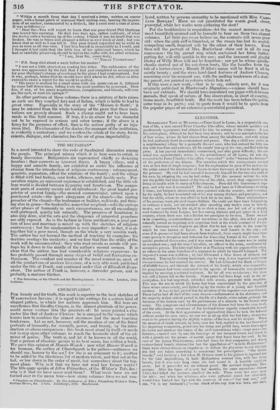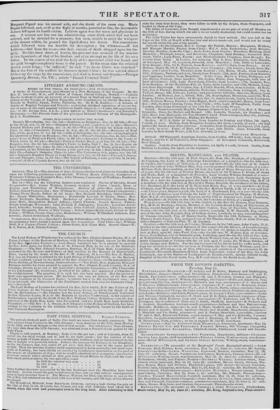GLEANINGS.
REMARKABLE TALE OF MURDERS.—There lived in Lyons, in a respectable sta- tion of life, a man named Peter Claudius Chevallier, whose amiable qualities and gentlemanly appearance had obtained for him '.he esteem of the citizens. It was his native place, although he had been long absent ; and he was married to the last of four wives, whom he had chosen from among the inhabitants, and with whom he had uniformly lived in contentment and peace. One day a child was stolen in a neighbouring village by a genteelly dressed man, who had enticed the little sic- tins with bon-hens and caresses, till he caught him up in his arms, and fled with the prize. A hot pursuit immediately commenced, and after great difficulty, the cri- minal was apprehended ; when. to the astonishment of all Lyons, he was dis- covered to be Peter Claudius Chevallier, "sous-chef" in the " bureau des finances" of the prefecture of the Rhone. The sensation which this circumstance excited was at first that of simple surprise ; but the explanation he gave of his motives for the crime caused the inhabitants of Lyons to turn their eyes at least in doubt upon the prisoner. He said he had intended to console himself for the loss of a child of his own, by adopting the one he had stolen. Till this moment neither his wife nor the public had ever heard of the loss of his child, which they supposed to be living in health with its curse atVilleurbannes. How did this bereavement hap- pen, and why was it concealed ? He said he had been to 'Villeurbannes to bring it home, but fatigued, intoxicated, unacquainted with the country, and overtaken by the night, he had wondered out of his way among thickets and precipices, and lost the child, whom he was afraid to look for in the dark. These circumstances of his journey were physical impossibilities. He could not have been fatigued by so ordinary a walk, nor intoxicated after spending only twelve sous in refresh- ments, nor overtaken by the night in so short a time, nor led out of a straight road bordered by thick hedges, nor lost among thickets and pre:ipices in a level country, where there was not a thicket nor precipice to be seen. There seemed to be something so extraordinary and myi.terious in this affair, that at last people naturally turned an inquiring and suspicious look at the whole conduct of the pri- soner. Surmises even began to get afloat that he had no right to the mune by which he was known at Lyons. It was one well known in the city : and even if its possessor had been absent from boyhood, there surely might have bees some person to recognise and welcome the wandering Ismael at his return. In- quiries produced discoveries, and it was soon known that the name was in reality an assumed one ; and the true Chevallier, an officer in the army, confronted the accused in person. The latter had fallen in at Flushing with the papers of the other, an officer in the same battalion of a regiment to which he himself belonged. The impostor's name was Lehevre ; lie had fabricated a false leave of absence and deserted. Tracing his history backward, step by step, it was inquired under what circumstances he hail entered the service. He had defrauded the Bank of France of 60,000 francs, and through the interest of his family, which was respectable, his punishment had been commuted to the species of honourable tram-potation implied by entering a colonial regiment. So far all was satisfactory; but there was still a hiatus left in the history. Some years had been leapt over in the in- vestigation, few but important, crowded with events, pregnant with suspicion. This was the era in which his home had been consecrated by the presence of three wives successively, and lighted up by the smiles of a young and beautiful mistress. It was to this period that the attentions of the inquirers was now directed. These ladies had all died of the same disease—inflammation in the abdomen; and the majority at that critical period in the life of a female, when nature prolongs the duration of the human race by the performance of a miracle in the human eco- nomy. The symptoms and circumstances of the disease had been the same in all, and the affectionate attentions of the husband-lover equally remarkable in each of the cases. At the first appearance of approaching illness be took the beloved sufferer under his own care ; no one was to sit up with her but him ; no one was even to be present during the nightly watches of his love and his despair. When the moment of death arrived, he hung, over the bed, replied to the last farewell of his departing companion, gazed into her damp and pallid face, wrote down upon his heart and memory the traces of the swift convulsions which swept across her features, counted one by one the hearings of her tortured-breast, and drank in with a greedy ear the groans of mortal agony that burst from her soul. In the case of the young Dutchwoman, who had ,been his first companion, anis whose extraordinary beauty obtained for her the appellation of r la belle Hollandaise,'' there were circumstances so singular as to induce the physicians to ask whether she had not taken something to counteract his prescriptions. "She drinks brandy," said Lelif-'vre ; but when M. Dittmar went to his patient to reproach her for the fetal imprudence, la belle Hollandaise assured him, with her elytag breath, that it was very long since she had tasted it. A horrible suspic:on arose. Let it pass—for we are without proof. He married Stephanie Des- granges. After the lapse of a very few months, the same mysterious disease which had killed the mistress attacked the wife. There were two cups upon the tat-de, and when her relations, who were gathered round her death. bed, would have bathed her lips with the contents of one—" Not that one,' said she, r: it is my husband's ;"—she drank of the cup that was hers, and wed. Margaret Pigard was his second wife, and she drank of the same cup. Marie Riquet followed, and, swift as the flight of months, punctual as fate, the inscrutable disease fell upon its fourth victim. Lelievre again was the nurse and physician in one. A woman saw him one day administering some drink which had not been ordered, and he desisted for a moment; but seen, unable to resist the whispers of the demon within, he poured the liquid down her throat. The convulsions which followed were too horrible for description ; the witnesses—all but Lelievre—fled front the room—the dark curtain of death dropped upon the tra- gedy. Besides these deeds of horror, the prisoner was accused of the murder of two Spaniards, of that of his brother, and of an attempt on the life of his own father. In the course of the trial the body of his murdered child was found, and the guilt brought completely home to the parent. In the mean time the criminal denied every thing ; "he suffered," he sold, •` as Jesus Christ was crucified." But at the foot of the scaffold his firmness deserted him ; he was carried almost lifeless up the steps by the executioner, and died in horror and despair.—Foreign Quarterly Review, No. VII.; article " French Criminal Trials."



















 Previous page
Previous page